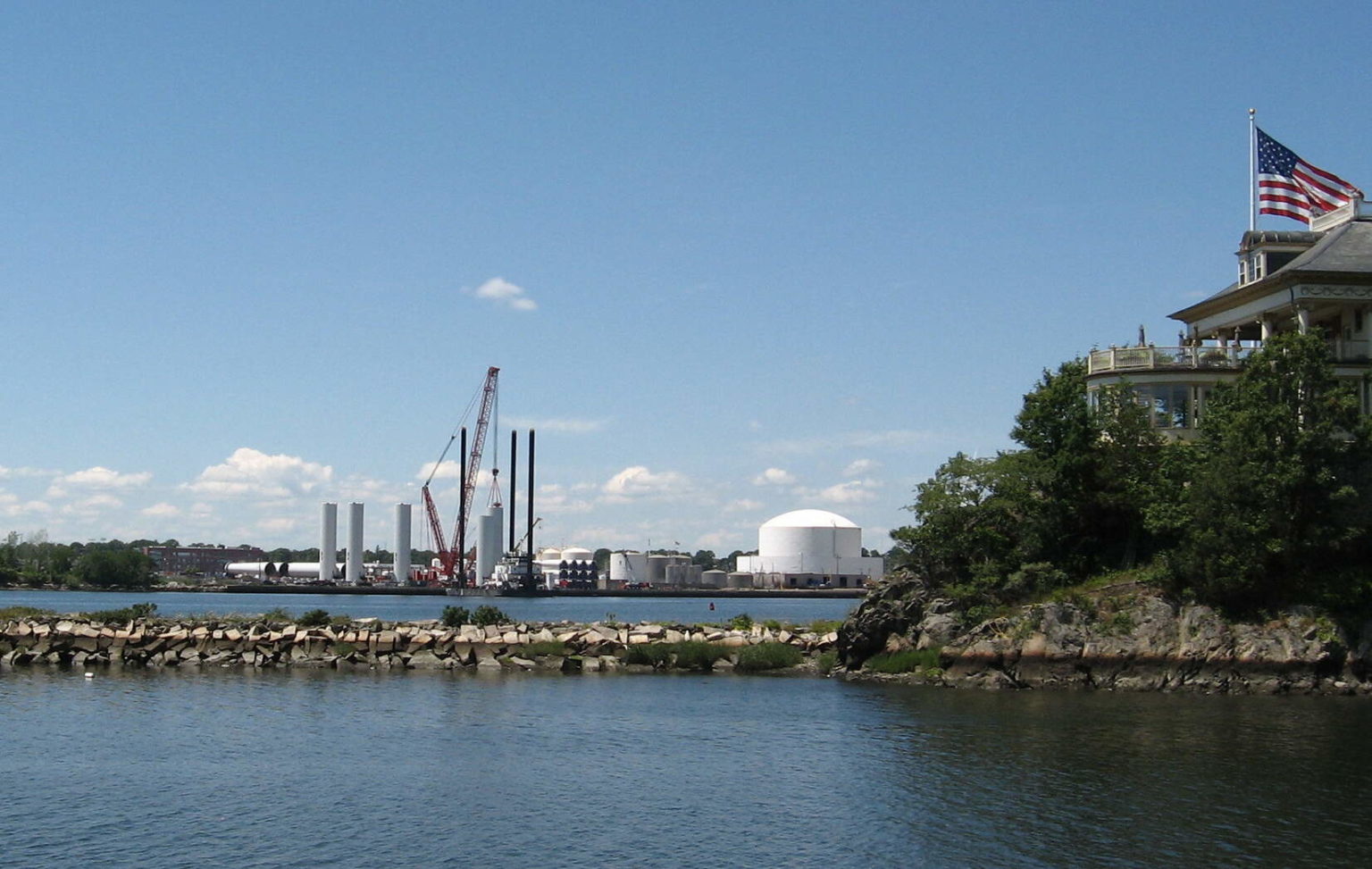A New England-based environmental law group is taking major oil companies to court, claiming the firms have failed to adapt some of their petroleum storage terminals to withstand increasingly severe storm and flooding events worsened by the climate crisis.
The Conservation Law Foundation (CLF) is currently suing both ExxonMobil and Shell in two separate lawsuits brought under federal laws regulating water pollution and hazardous waste, including the Clean Water Act. The cases center around coastal oil terminals and their vulnerability to climate change impacts like sea level rise and heightened storm surge. Exxon operates an oil terminal in Everett, Massachusetts, just outside of Boston, that sits along the Mystic River. Shell’s terminal is located in Providence, Rhode Island, along the Providence River.
CLF argues that these facilities pose a grave risk not only to the waterways and environment but also the surrounding communities, given that the oil terminals currently are not designed to standards that account for climate impacts.
“This facility is the ticking time bomb,” CLF attorney Chris Kilian said, referring to the Providence terminal, during a hearing held via Zoom on Thursday, August 13. The federal judge presiding over the case, District Judge William Smith, raised a similar point in questioning one of the lawyers representing Shell. Judge Smith said the situation prompting CLF to bring its lawsuit seems to be that “a bomb is going to go off, we just don’t know when.”
We’re in court against Shell Oil RIGHT NOW as a result of our lawsuit against the fossil fuel company for endangering the Providence River and local communities. Learn more about this fight to hold corporate polluters accountable: https://t.co/X7dF4Yz8i8
— Conservation Law Foundation (@CLF) August 13, 2020
A major storm or flooding event, which climate scientists say are becoming more intense because of climate change, would represent that proverbial “bomb,” resulting in a potential environmental disaster should Shell’s storage tanks rupture or otherwise leak or spill petrochemicals into the Providence River. This situation has already played out elsewhere in the U.S., such as in Houston during Hurricane Harvey in 2017 and in New Jersey and New York in the wake of Hurricane Sandy in 2012. Oil and petrochemical facilities hit during the storms spilled their hazardous contents into waterways and neighboring communities. Shell’s oil terminal in Providence, as CLF pointed out during the hearing, experienced “uncontrolled releases” of pollution during heavy flooding that occurred in 2010.
Still, Shell argues that climate risks are “speculative” and not substantial in the near-term, and therefore it is not required to take action to fortify its Providence oil terminal. Shell is trying to get the case dismissed and further argued that concerns about designing the facility to withstand extreme weather events should have been raised during a recent permitting process, when the oil major was obtaining a new permit for its Providence facility in 2019.
CLF, which first filed the case against Shell in 2017, argued that it is simply suing to enforce the permits. According to CLF, the permits impose a duty on Shell to adhere to best engineering practices in light of climate risks.
“It is defendants’ obligations to employ best engineering practices to address the risks of climate change,” CLF’s Kilian said during the hearing. “They have done nothing to protect Providence River, the surrounding communities, and even their own facility from the known and foreseeable risks from extreme precipitation that are already occurring.”
Judge Smith did not make an immediate ruling in the case but said he expects to issue a decision “in the near future.”
CLF vs. Big Oil in Massachusetts and Connecticut
In Massachusetts, CLF is pursuing a very similar case against ExxonMobil, and the judge in that case issued a stay, or pause, on proceedings earlier this year. The judge had ruled last year that the case could proceed, but in March he decided to hit pause while the U.S. Environmental Protection Agency reviews and updates Exxon’s permit for its Everett terminal, with a renewed permit expected by 2022.
CLF is appealing that decision, pushing for the case to go ahead despite the permitting process.
The environmental organization may soon have yet another climate adaptation case on the books in Connecticut, this time targeting owners of vulnerable oil terminals in New Haven. CLF recently sent letters of intent to sue to three oil companies, Gulf, Magellan, and Shell, that own and operate terminals in flood-prone areas of this coastal Connecticut city.
Flooding could flush hazardous and solid waste from Shell, Gulf Oil, and Magellan facilities in New Haven into the harbor and nearby rivers, poisoning surrounding areas with toxic pollution. We’re suing. More in @BLaw: https://t.co/G3NDygoaFf
— Conservation Law Foundation (@CLF) August 4, 2020
“The communities surrounding these terminals are constantly at risk of being inundated with a stew of oil and toxic materials. It’s long past time for these companies to step up and prepare their facilities for flooding and extreme weather,” CLF President Brad Campbell said in a press release announcing the impending New Haven lawsuit. “The courts must hold them accountable under current law to avoid catastrophe.”
Meanwhile, communities across the U.S. are suing major oil companies like Chevron, ExxonMobil and Shell over the mounting costs of climate impacts, claiming these companies publicly downplayed climate risks even while taking precautions to protect their own infrastructure from these risks, and in some cases, even asking taxpayers to help cover those costs.
Main image: East Providence, Rhode Island. Credit: Crop of original by JJBers, CC BY 2.0
Subscribe to our newsletter
Stay up to date with DeSmog news and alerts







